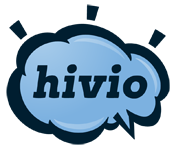 Radio strategy consultant Mark Ramsey is hosting a one-day “ideas festival” for radio called Hivio in San Diego today. While I wish I could have flown out to sunny Southern California to attend in person, I’m glad to watch a live feed of the show from my back deck in sunny Chicago today.
Radio strategy consultant Mark Ramsey is hosting a one-day “ideas festival” for radio called Hivio in San Diego today. While I wish I could have flown out to sunny Southern California to attend in person, I’m glad to watch a live feed of the show from my back deck in sunny Chicago today.
Ramsey introduced the show this morning to frame its raison d’être to the audience: that radio needs to look to ideas that come from outside the radio industry. That’s why more than half the conference speakers aren’t from radio.
He suggested that maybe radio isn’t as special as those inside the industry like to think it is, asking the provocative question: “If you’re going to make plans to the future, is it better to make them on the basis of myths or on the basis of reality?”
Ramsey then outlined a list of radio’s vulnerabilities, which are areas which other media compete with radio, taking away audience. According to Ramsey, the most vulnerable area is “soundtrack,” where radio provides music for a listener’s day. There are obvious competitors and replacements in this area, from smartphones to Pandora.
Star access is where radio is least vulnerable, Ramsey argued. This is where radio has exclusive content and talent that can’t be found elsewhere. Whether it’s Howard Stern on SiriusXM or Terry Gross and Fresh Air on NPR, this is the place where the old adage is relevant: content is king.
As a counterpoint, Ramsey gave the examples of Marc Maron and Kevin Smith, two very popular podcasters who have moved to cable TV, but not radio.
Of course, I can’t agree enough that personalities and content are king on radio. My opinion is that’s where commercial radio has failed epically for the last decade and a half, ever since the biggest owners, like Clear Channel, started treating stations more like Monopoly houses, firing local talent and squeezing the life out of content.
This is a valuable conversation for the mainstream radio industry to have, and one that I think public, community, college and low-power stations can benefit from. In some ways it’s a sign of mainstream radio’s predicament that it takes an effort from outside the main industry players to even broach these questions.
Strategy is important, and it has to be about more than just marketing and branding. But economics will trump. Commercial radio has to be willing to spend money on content and talent, not just talk about it.
That said, I look forward to the rest of Hivio today.


